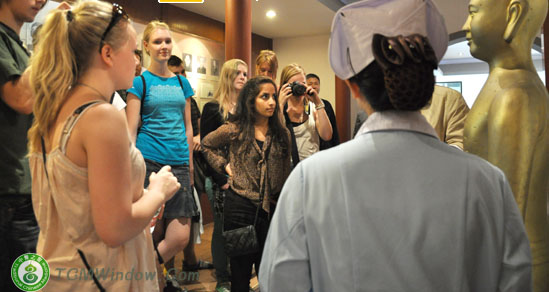
A group of students from USA are attending a lecture on typology at TCM WINDOW.
In the West and increasingly in China, the biology of male and female is culturally and politically contentious. In her influential book, Evolution’s Rainbow, Stanford biologist and transgender woman, Joan Roughgarden reveals the diversity of sex among animals, and argues for the normalcy and desirability of such diversity in humans. This comes in contrast to the long held belief in the immutability of sex, derived from western philosophy and science, including Darwin’s theory of ‘sex selection’.
Ancient Chinese philosophy and medicine also have a lot to say about the typologies of male and female. ‘’Heaven has yin and yang; people have man and wife,’’ affirms the classic text of Chinese Medicine, Yellow Emperor’s Inner Cannon. In Chinese philosophy and medicine, Yin and Yang are the basic constituents or energies of male and female bodies. Men are said to have more yang qi, and women, more yin. These binaries, however, are not as fixed as their western counterparts. In fact, they aren’t binaries at all, but fluctuating balances. Hence two other early texts, "Harmonizing Yin and Yang" and "Discussion of the Realized Way of All Under Heaven" say that: "What assists life is eating; what injures life is lust. Therefore the sage when conjoining male and female invariably possesses a model." Such philosophies arguably leave ample room for modern reinterpretations of sex and gender binaries. With this in mind, and having last week mainly looked at women’s health and TCM, it now seems only fair to ask what TCM has to offer modern ‘men,’ and ‘masculinity’?
Chinese medical and Taoist theories discourage rigorous exercise, preferring gentler movements and stretches-tai chi and its antecedents. Working muscles to exhaustion, a common part of ‘bulking up’ in western gyms, would certainly be frowned upon. Speaking in an interview with Men’s Health China, the more aptly titled ‘Trend Health’ in Chinese, well-known TCM practitioner Xu Wenming (whose name, interestingly for us, translates as gentle, literary solider) said that "‘man’s’ life comes in 8-year cycles, reaching its peak when he is 32.Though at this point intensive exercise and staying up all night may not harm the body, afterwards moderation should be accorded most importance’’
Yet, with the influx of western ideals, and particularly the modern gym, needs increasingly must. On my way to a yoga class at a Kunming gym, in the south of China, one Chinese man in his late forties told me that he’d given up tai chi because it wasn’t ‘rigorous’ enough. His arms were at least three times the size of mine (which couldn’t generally be said of the older men practicing qigong in the park outside). Perhaps he had followed the advice dispensed in Men’s Health Singapore: eat crocodile meat. Highly prized in TCM, it is also packed with protein, so is perfect as a ‘muscle-builder’. Few meals are manlier than crocodile, especially if you’ve killed the beast yourself.

![Diseases, Symptoms, tcm, [tcmwindow.com]](/uploadFile/adImg/2015/4/24/6de633b8-0a7a-4546-868a-02389edf5c65.png)





